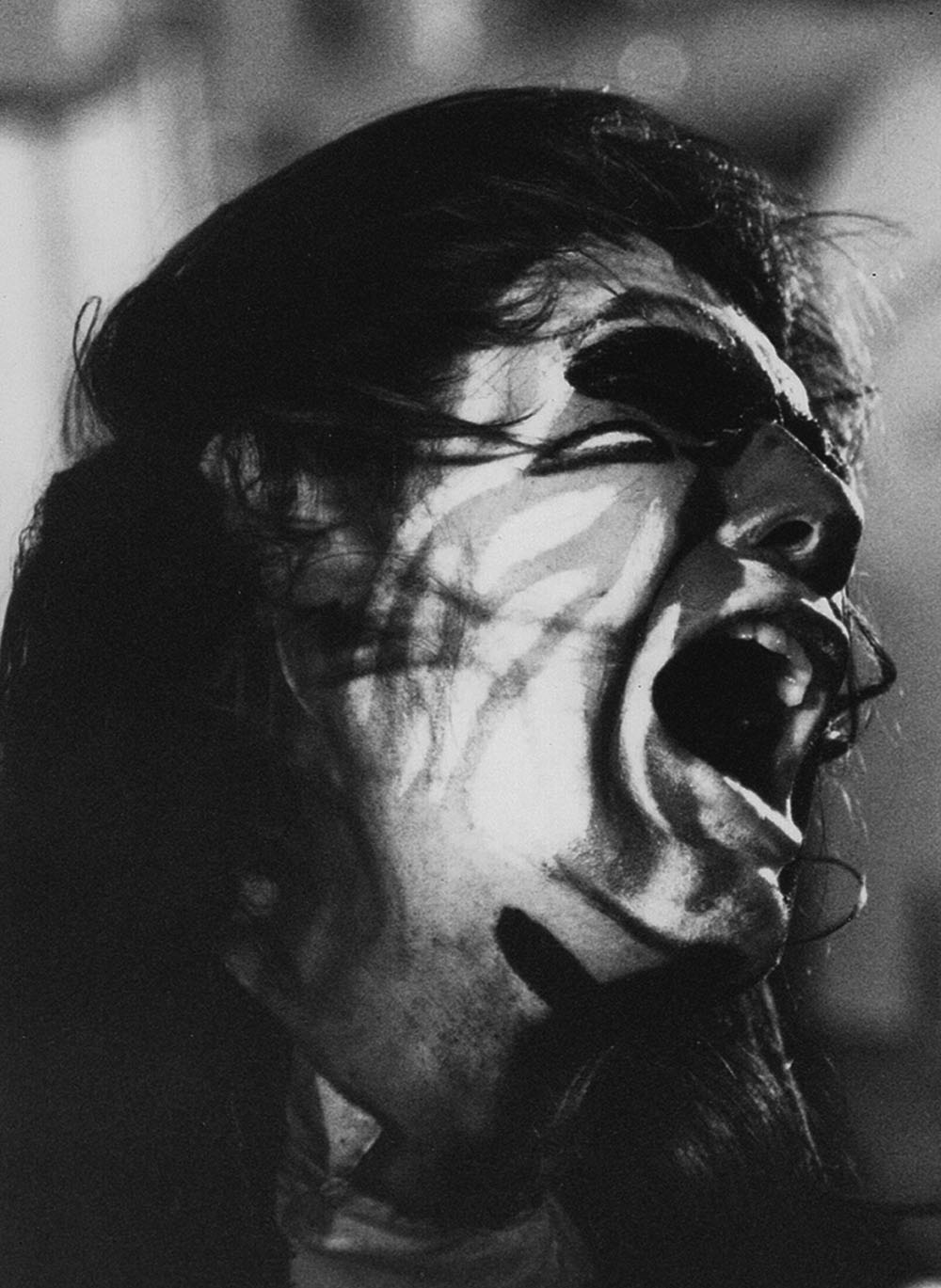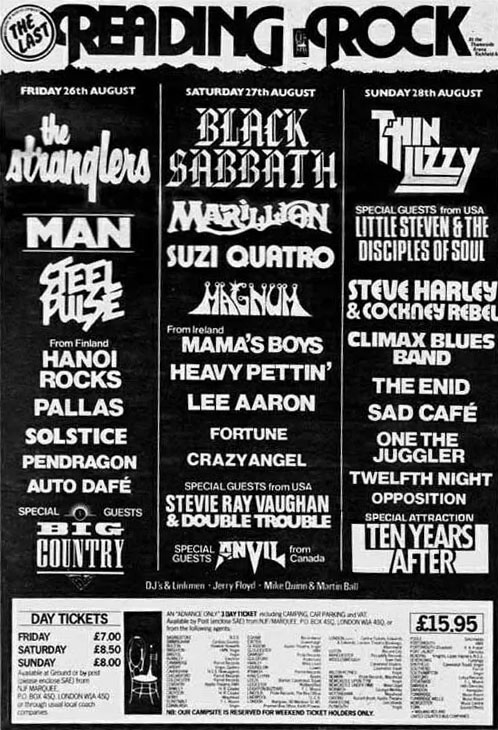 Back in the early 80s, a prog rock revival was as an unlikely an incident as one could have dreamt of. Punk rock had heralded the harsh wind of change in 1976, and although the phenomenon actually lasted less than a year the after-effects were felt for years. The ensuing interest in new wave helped forge the new romantic movement of the early 80s.
Back in the early 80s, a prog rock revival was as an unlikely an incident as one could have dreamt of. Punk rock had heralded the harsh wind of change in 1976, and although the phenomenon actually lasted less than a year the after-effects were felt for years. The ensuing interest in new wave helped forge the new romantic movement of the early 80s.In the interim, the grubby yet more fun approach of the NWOBHM had seen heavy metal take on a new form, which would have equally far-reaching implications for the genre. Taking threads from all of these, yet remaining rooted in the prog rock movement of the early 70s that had nurtured the rise of the likes of Genesis, Yes, ELP and Pink Floyd, was the new wave of British prog rock: bands like Marillion, Pallas, Twelfth Night, Pendragon and IQ.
“We didn’t look like hobbits,” says IQ keyboard player Martin Orford, reflecting on some of the more cosmetic reasons why these new younger bands differed from the old guard. “And we weren’t your typical prog rock band in as much as we hadn’t been to public school, we were all from a working-class background.”
Socially, given the public school background of a band like Genesis or the art-school start of Pink Floyd, as well as the more intellectual music approach of these bands the perception was that prog rock was the domain of the youthful public schoolboy.
No one would deny the appeal, although writing from experience, prog rock was no more popular at public school than heavy metal, punk, or the pop fad of the day.
Before bands like Marillion began appearing, prog rock had been the domain of older siblings – the archetype being the greatcoat-wearing elder brother proudly clutching a copy of Jethro Tull’s Aqualung or Genesis’s The Lamb Lies Down On Broadway under one arm like a badge.
My own personal feelings on the intrigue this new scene offered a young rock fan were reflected in the pages of the now defunct Sounds music paper. There had been an ill-fated new psychedelic movement that spawned the likes of Dr & The Medics, Le Mat (who would swiftly transfer their allegiance to prog) and Mood Six.
Yet no sooner had interest waned, than small news stories referring to a new prog movement began appearing in the paper. Writers like Phil Bell and Classic Rock’s own Hugh Fielder appeared as champions of new prog – although the latter, a staunch supporter of the old guard, often appeared vaguely suspicious of the new breed.
By the time fledgling metal mag Kerrang! had run a cover feature exploring this new musical phenomenon, though, everything was in full swing. Lack of decent coverage of rock in the UK media was hardly new in the early 80s, and despite the support of the aforementioned magazines, the bitterly cynical approach of papers like NME and Melody Maker led to a swathe of fanzines supporting the new prog scene.
My own Court Jester was typical of the time – a small but successful organ, inspired by Marillion’s own The Web newsletter. Equally worthy were fanzines like Afterglow, Slogans, Exposure and Aspidistra, all of which offered a mouthpiece to the movement, while the likes of The Amazing Pudding (Pink Floyd), Opel (Syd Barrett) and Relayer (Yes) among others, concentrated on specific bands.
So, where was it all happening and who was making it happen? For most people, London’s Marquee Club in Wardour Street during 1982 is where things seemed to be fermenting, although as Pendragon’s Nick Barrett points out things were starting to happen all over the country.
“[Pendragon manager] Greg Lines booked a new band called Marillion to play in Gloucester with Pendragon supporting them. Marillion brought a lot of fans with them, and it was an opportunity to play in front of an audience that already loved prog rock. The two bands hit it off right away, and [Marillion drummer] Mick Pointer asked Pendragon to support them at the Marquee. And so started the roller-coaster ride of Pendragon.”
Aylesbury’s Marillion were very much the standard-bearers for this new musical force. Having been around in one form or other since 1979, the band (who took their name from Tolkien’s The Silmarillion) began to make a serious impact in the early 80s with the arrival of towering Scottish vocalist Fish, and keyboard player Mark Kelly from Essex prog rock band Chemical Alice.
The first major players of the movement to sell-out the Marquee, Marillion were also the first band to sign a major deal – with EMI, who released their debut single, Market Square Heroes, in October 1982. They celebrated their success with a series of headline gigs at the Marquee around Christmas 1982, and within the year the band were headlining London’s Hammersmith Odeon with their debut album Script For A Jester’s Tear.
Marillion’s big step to success also acted as a springboard for other bands, helping to open them up to a wider audience, as well as generating media interest. My first prog gig would have been Marillion supported by Pendragon and folk prog act Solstice back in the mists of 1982.
Yet no sooner had interest waned, than small news stories referring to a new prog movement began appearing in the paper
“We’ve never been influenced by Marillion,” a defiant Martin Orford pointed out to one Dutch journalist who had the temerity to imply this in an interview in 1997. “Marillion had nothing to do with us. The Lens was from before Marillion ever started, and IQ came from The Lens. So there’s no way to say IQ came about because Marillion started getting success.”
Aberdeen’s Pallas were the next band after Marillion to sign a deal, ironically with Harvest, the old EMI prog rock imprint. Pallas had been around since the late 70s when they’d been known as Pallas Athene, and released their own live album, Arrive Alive in 1981. After a headline run at the Marquee they hooked up with EMI, who promptly put them in the studio with producer Eddie Offord (known for his work with Yes and ELP).
In keeping with many frontmen of the genre, Euan Lowson – much like Fish, IQ’s Peter Nicholls and Twelfth Night’s Geoff Mann – dabbled in performance theatrics. In Lowson’s case this meant climaxing Pallas’ set as half old man, half woman and acting out a brutal rape scene for the epic The Ripper (the infamous Yorkshire Ripper case was very much to the fore of public imagination at the time). Pallas’s debut album, The Sentinel – replete with cover art from fantasy specialist Patrick Woodroffe – was released in 1984.
Twelfth Night came from Reading, having risen from the ashes of the Andy Revell Band in September 1978. By the time Marillion had signed to EMI, Twelfth Night had several cassette and seven-inch releases under their belt, as well as 1981’s Live At The Target album. It was 1982’s Fact And Fiction that helped Twelfth Night gain major recognition, though, and led to a deal with Music For Nations for 1984’s Live And Let Live, after which vocalist Geoff Mann left. They then released Art And Illusion with his replacement Andy Sears, before signing to another label, Virgin, for 1986’s Twelfth Night album.
IQ evolved out of Hampshire’s The Lens in the late 70s, and by the time they’d released their self-financed Seven Stories Into Eight cassette in 1982 they had made the move to London and were regulars at the Marquee. IQ’s Tales From The Lush Attic (1983) and The Wake (1985) followed, and then vocalist Peter Nicholls left. He was replaced by Paul Menel for 1987’s Nomzamo, which was set up by Metallica/Def Leppard manager Peter Mensch.
Then there was Pendragon from Gloucester. Originally Zeus Pendragon, they too were regulars at the Marquee. Featuring the exquisite guitar playing of singer/guitarist Nick Barrett, early cassettes sold well, and although they failed to land a major record deal they released the Fly High, Fall Far EP (1984) and debut album The Jewel (1985) on their own Elusive record label.
These bands weren’t the only players of note, although they were certainly the leading contenders. Chesterfield’s Dagaband, East Anglian band Airbridge, Essex’s Tamarisk (who had developed out of Chemical Alice), Middlesex trio Liaison, Herts act Gothique and London’s own Quasar all made an impact to various degrees, as did Sheffield band Haze, who are still a going concern in some form to this day.
While it’s true to say that only Marillion went on to achieve truly massive fame and commercial success – and even then, only for a short period – the fact that most of these bands continue to exist in one form or other pays testament to the strength of the genre and the bands’ own ability to outlive trends. Yet back in 1983, it really did seem as if the world might be their proverbial oyster – especially for those bands who made it on to the bill for that year’s Reading festival.
 For many, 1983’s Reading was about either Black Sabbath, with Ian Gillan singing Smoke On The Water, or what turned out to be one of the last appearances of Thin Lizzy. But it was also the year that the new wave of British prog bands made their presence known at the festival. Pendragon, Pallas, Solstice, Marillion and Twelfth Night all played that year, while long-time festival faves The Enid and a resurgent Magnum also made winning appearances.
For many, 1983’s Reading was about either Black Sabbath, with Ian Gillan singing Smoke On The Water, or what turned out to be one of the last appearances of Thin Lizzy. But it was also the year that the new wave of British prog bands made their presence known at the festival. Pendragon, Pallas, Solstice, Marillion and Twelfth Night all played that year, while long-time festival faves The Enid and a resurgent Magnum also made winning appearances.Typically, Marillion got most of the headlines, having opened their set with their lengthy epic Grendel – despite having previously announced they would never play it again (it was the last live airing of the song) – and immediately winning over the audience. It was also a rare outing with Marillion for drummer Andy Ward, once of Camel (although stand-in drummer John Marter was on hand should the wayward Ward have combusted on stage).
Marillion aside, the presence of most of the major players on the new prog scene seemed to signify that the music industry – which had thus far been resistant to the peculiarly English charms of most of these bands – might be taking notice. Alas it was not to be.
“I suppose it’s all based on the recession of the late 70s when all the record companies were looking for singles acts,” said Twelfth Night drummer Brian Devoil, on why Twelfth Night struggled to get a major deal. “The days when you’d make a demo, go to a record company with it and they’d say ‘Let’s go in the studio and see what we come up with’, have gone.”
Twelfth Night did land a major deal with Virgin in 1985, but by the time their self-titled album was released in 1986 they band had lost much of the momentum they had built following Fact & Fiction.
Singer Geoff Mann, widely regarded as one of the nicest frontmen of the entire scene, left in 1983 to pursue a solo career. He also became a vicar, before sadly passing away of cancer in 1993. His departure from the band while they were at their peak was something they never recovered from. Mann's replacement Andy Sears was never quite up to the mark, and certainly lacked Mann’s immense character. By 1987 it was all but over for Twelfth Night.
Pallas also suffered, this time at the hands of EMI/Harvest. Despite a strong showing with 1984’s The Sentinel, singer Euan Lowson left the band within months of the album’s release. Despite a fine replacement in Alan Reed from Scottish band Abel Ganz, EMI – probably less than impressed by the change in line-up, and aware of the progress being made by labelmates Marillion – began to stall on important decisions. Pallas also wavered, and second album The Wedge wasn’t released until 1986, by which time their momentum had also stalled.
Both IQ and Pendragon persevered and maintained some degree of success, and both are effectively the standard bearers for the genre today, flying the prog flag along with new bands that have appeared in recent years: Porcupine Tree, Coheed & Cambria, The Mars Volta.
IQ, who have set up their own GEP label to release their albums, suffered – unsurprisingly – at the hands of a major when they signed to Squawk via Phonogram. Having undergone a line-up change, with Paul Menel replacing the now returned Peter Nicholls, not even being championed by rock uber-manager Peter Mensch could help the band, who released Nomzamo in 1987 and Are You Sitting Comfortably in 1989.
“We were signed directly to Squawk, who were using Phonogram for marketing and distribution,” explains Martin Orford. “But as Phonogram hadn’t actually signed us, they weren’t interested. It’s not hard to sell prog rock, but they couldn’t do it.”
By contrast, Pendragon kept a stable line-up for 20 years following 1986’s 9:15 Live, which also features keyboard player Clive Nolan, the main engine behind younger prog act Arena. Dogged by bad luck, the five-year gap between The Masquerade Overture (1996) and Not Of This World (2001) was typical of how funding your own career without major backing can have its major drawbacks.
Major-label and media indifference to the genre wasn’t the only reason why Marillion are still the only band that trips off anyone’s tongue in reference to the new wave of British prog rock. Very early on it was apparent that Marillion could combine giant swathes of atmospheric prog rock with a commercial bent that found them frequenting the UK charts from the time He Knows You Know made No.35 in February 1983.
Not even the acrimonious split with frontman Fish in 1988 and the arrival of Steve Hogarth in 1989 hampered their progress, yet they too have adopted a cottage-industry approach with their own Racket label.
No one would deny the appeal, although writing from experience, prog rock was no more popular at public school than heavy metal, punk, or the pop fad of the day
Nevertheless, if Marillion were the new Genesis, then Pallas were Yes, Pendragon were Camel, Twelfth Night were Pink Floyd and the Dagaband were ELP. Lazy journalism, perhaps, but such tags were just as likely to put off prospective listeners as draw them in. Needless to say, such labelling infuriated those being labelled.
“In the dictionary it doesn’t say with progressive – ‘recreate in finest detail everything that has gone before. Do not inject your own ideas’. Progressive means progress,” IQ’s Peter Nicholls points out. “By all means take all the bands that were there in your youth – Genesis, Yes, Floyd – by all means use them as a starting point, but then you should do your own bloody thing.”
The prog revival of the 80s may not have catapulted many bands to superstardom, but it reignited an interest in the genre. In 1982 it also saw a resurgence in the so-called ‘dinosaur’ bands of the 70s, who had largely withdrawn to lick their wounds after the onset of punk rock.
Asia, the prog rock supergroup, came along in 1982 with their hugely successful debut album Asia. Genesis returned in 1983 with Genesis, an album which may have revolved around Phil Collins-oriented pop hits but which also harked back to earlier, proggier days with the broodingly dark Mama and the epic, two-part Home By The Sea.
Yes underwent an even more drastic change, returning in 1984 with the techno-prog 90125 and the hit Owner Of A Lonely Heart. And even giants ELP and Pink Floyd made active returns.
These days ‘prog’ isn’t a dirty word any more, although that may take some time to get used to. As Phil Collins told Sounds back in 1982 when asked about the impact of Marillion: “I wouldn’t wish it upon anyone to try and be successful in this day and age, being a parody of a band nobody likes".
By Jerry Ewing (Classic Rock) March 23, 2021. Reproduced by kind permission.

< back


